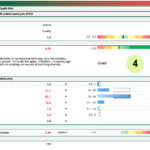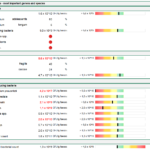The Real Cause Of Alzheimer’s Disease: Lifestyle
You may also be interested in the section of my blog dedicated to brain health, click here, in particular:
- What Causes Brain Fog? And How To Get Rid Of It?
- Can Gut Health And Our Microbiome Affect Mental Health?
Does Alzheimer’s Start In The Gut?
Over the last 15 years, the functions of the intestinal microbiome have been revised owing to the establishment of a direct link between density and species composition of the intestinal microbiome and a number of pathological conditions including diabetes, obesity, and cardiovascular diseases. These diseases, in turn, are the established risk factors for the development of Alzheimer’s disease, and there is data indicating that gut microbiome influences brain functions.
There are many undesirable lifestyle factors in the modern society that may contribute to Alzheimer’s disease development. These factors include unhealthy diet, lack of sleep, circadian rhythm disturbance, chronic noise, sedentary behavior and, in turn, gut microbiome is highly sensitive to these factors..
A study of the composition of the intestinal microbiome in patients at the Alzheimer’s Disease Research Center revealed significant differences in the composition of the intestinal microbiome in patients with Alzheimer’s disease and healthy people at the phylum and species levels. These studies demonstrated a decrease in the number of bacteria in the Firmicutes and Actinobacteria phyla (in particular Bifidobacterium), and an increase in the number of bacteria belonging to the Bacteroidetes and Proteobacteria phyla in the intestinal microbiome of AD patients (1).
The results of these studies demonstrate that the changes in the taxonomic and functional composition of the intestinal flora are able to influence brain functions (1).
All of these bacteria, and many more can be tested for in the Healthpath stool test:
Unhealthy Nutrition Linked to Alzheimer’s Disease
So-called “Western diet” (WD), which is characterised by high intake of saturated fats and added sugars, is one of the symbols of the modern lifestyle and it is an established risk factor for AD development.
For example, it has been demonstrated that Alzheimer’s disease rates increased from 1% in 1985 to 7% in 2008 in Japan, and this increase is associated with a change from the traditional Japanese diet to a Western diet. In fact, preclinical experiments have confirmed that high fat diet may change the gut microbiome and contribute to dementia (1).
Exercise Linked to Alzheimer’s Disease
Accumulating evidence indicates that sedentary behaviour can be a risk factor for cognitive decline, while physical exercise may be effective for preventing dementia. It has been shown that the mechanisms underlying the protective influence of physical activity on Alzheimer’s disease include:
- The production of antioxidant enzymes
- The decrease in oxidative stress and neuroinflammation
There is also data indicating that exercise can influence gut microbiome.
Sleep Linked to Alzheimer’s Disease
Insufficient sleep is another common part of modern lifestyles, and it has been suggested that disrupted sleep may promote the development of Alzheimer’s disease.
It is of our interest that chronic sleep disruption impacts gut microbiome.
Collectively, studies suggest that a lack of sleep combined with obesity, diabetes and high-fat diet can be a risk factor for Alzheimer’s disease and is associated with changes in the gut microbiome (1).
Circadian Rhythms, Intestinal Microbiome and Alzheimer’s Disease
A phenomena known as “social jetlag,” or the mismatch between social and biological clocks, is common in the modern society and causes circadian rhythm disruption (CRD). One of the causes of CRD is light pollution, which is a typical hallmark of the big cities. It is a matter of fact that sleep deprivation and CRD is one of the common and earliest signs of AD, and there is increasing evidence that CRD might be a contributing factor in Alzheimer’s disease pathogenesis (1).
In addition, the level of melatonin, one of the important regulators of our 24 hour body clock, is reduced in Alzheimer’s disease patients. There is data indicating that melatonin and the circadian rhythms regulate the gut microbiome, and that circadian rhythm disruption by abnormal light–dark cycles results in the dysfunction of the gut lining.
Chronic Noise Stress, Intestinal Microbiome and Alzheimer’s Disease
A large number of sources of noise pollution has appeared in the human environment since the onset of post-industrial era, thus making chronic noise another hallmark of the modern lifestyle. Epidemiological and experimental studies showed that chronic noise has been associated with cardiovascular diseases, hearing impairment, changes in the immune system and birth defects. Recently, an etiological association between chronic noise exposure and Alzheimer disease was proposed.
In 2018, a study demonstrated positive association between residential levels of noise and air pollution across London and incidence of dementia
Summary
- There is a strong correlation that exists between AD and modern lifestyle factors. It is a fact that unhealthy diet, lack of sleep, circadian rhythm disturbance, chronic noise, and sedentary behavior are linked to neurodegeneration.
References
- The Links Between the Gut Microbiome, Aging, Modern Lifestyle and Alzheimer’s Disease: click here.
- Exercise alters gut microbiota composition and function in lean and obese humans: click here.




